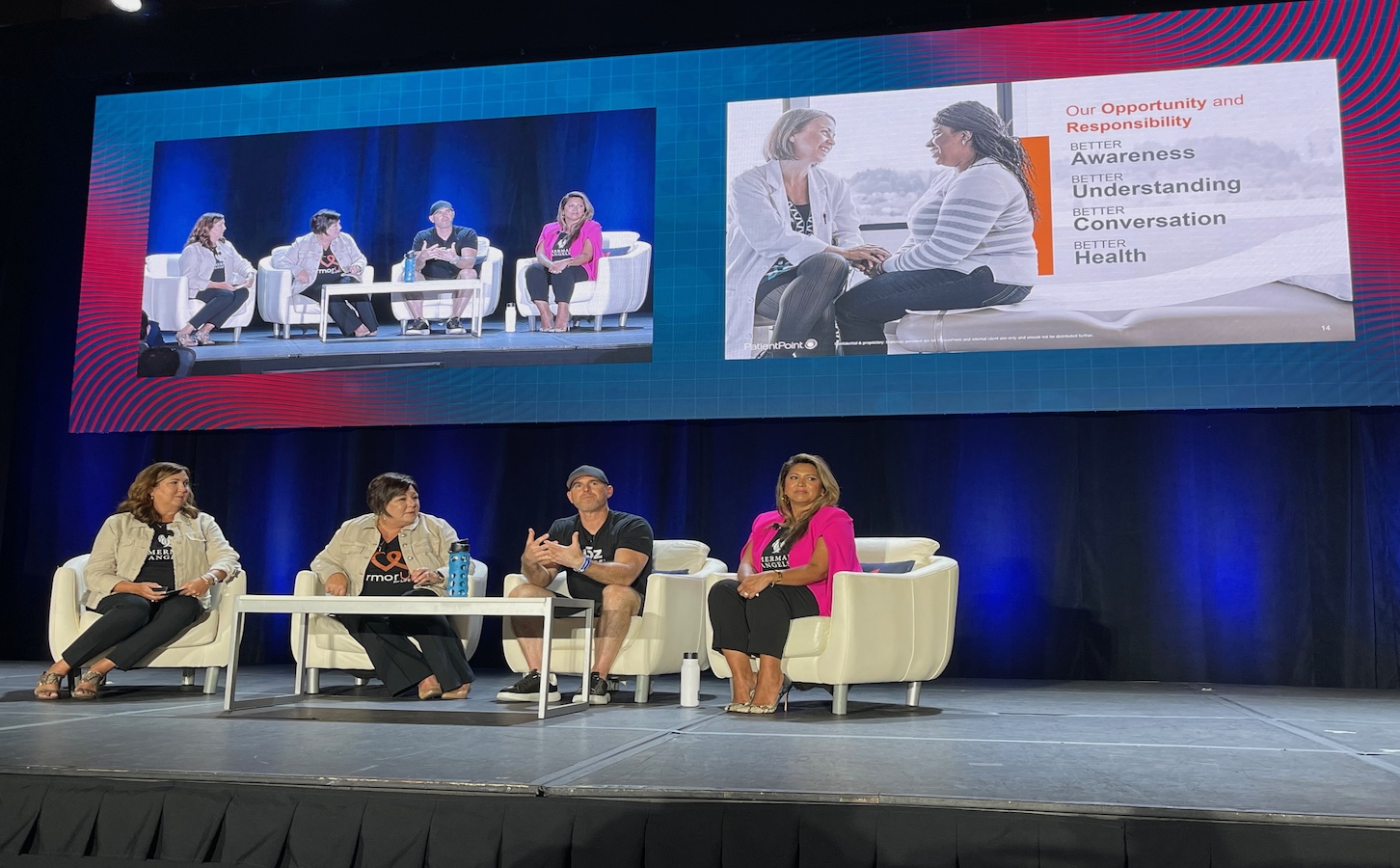Every year, around 1.6 million Americans are diagnosed with cancer. The cancer journey is tumultuous, with many moments that feel dismal and lonely. Loriana Hernández-Aldama, two-time cancer survivor and Founder of Armor Up for Life; Jonny Immerman, cancer survivor and Co-Founder of Imerman Angels and CLOZTALK; and Yesenia Bautista, Vice President of Point of Care Media at Publicis Health Media, know these feelings all too well.
Loriana, once a high-profile news anchor, was undergoing fertility treatments when she was diagnosed with AML leukemia. Due to the severity of her cancer, upon diagnosis Loriana kissed her two-year-old son goodbye and immediately boarded a flight to Johns Hopkins. After nearly a year at Johns Hopkins, bone marrow transplants and full-body radiation, her cancer was gone. However, five years later, Loriana received a call saying she had breast cancer from the full-body radiation—starting her second battle with cancer, which she would successfully defeat.
Then there’s Jonny, who was at a bar with friends when he experienced excruciating pain in his groin. At just 26 years old, Jonny was diagnosed with advanced testicular cancer. Throughout his journey, Jonny never met a young survivor like himself. Once he recovered, he knew he had to do something to ensure cancer patients never felt isolated. He created his nonprofit Imerman Angels to help cancer patients and survivors connect with one another.
And finally, there’s Yesenia, who found herself navigating a new, confusing path when her partner was diagnosed with colorectal cancer at the end of 2020. Yesenia had to become the ultimate caregiver—conducting endless research, making lifestyle changes, finding second opinions on treatment options and more.
These aren’t rare stories. There are hundreds, if not thousands, more just like them. Every day, countless Americans face difficult healthcare journeys that will change their lives forever.
Supporting Every Possible Patient
As a Point of Care company, we want to ensure that every patient has the resources, education and support needed throughout their healthcare journey. So, we commissioned a survey with OnePoll that asked 2,000 Americans their thoughts, feelings, wants and needs at the doctor’s office.
We found that patient anxiety has risen compared to last year—with 48% of patients feeling anxious before the doctor’s visit compared to 39% in 2022.
But why?
Many patients say it’s due to lack of information, rising costs and not knowing how to have a productive conversation with their HCP.
- 67% wish they knew how to describe their condition/symptoms better before talking to their doctor.
- 62% would love to have more information or advice on how to talk to their healthcare provider.
- 46% are concerned their doctor will be insulted or get angry if they push to find out more about their condition/symptoms.
Thriving Together in the Patient Journey
After facing numerous information gaps, Loriana, Jonny and Yesenia agreed that patients deserve more information and education about their symptoms, conditions and treatment options.
When patients do receive the proper information and education from their HCP, they feel less anxious. And as a result, they feel more empowered to ask questions, follow through with their treatment plan and take more positive actions toward improving their health.
55% would feel more empowered to talk with their HCP about their condition/symptoms if they received education during their visit.
How can we provide patients with the information they need? It starts with proper patient representation.
Powerful Patient Connections
When pharma brands don’t fully understand the patient journey, they miss a big opportunity to make a deeper, more impactful connection with patients. Loriana recalled feeling frustrated and unseen whenever she saw brands placing cancer patients in unrealistic situations.
“Please stop putting [in advertisements] smiling cancer patients riding a horse on the beach. I couldn’t even afford the beach, and I was not physically well enough to ride a horse,” she says.
Brands need to display more realistic messaging because, as our survey revealed, when patients have a realistic understanding of their condition and treatment options, treatment adherence is more likely to occur: Fifty-nine percent of patients feel more empowered to follow through with their treatment when they understand how it works, and 54% feel more empowered when they know why the treatment is important.
However, brand messaging not only needs to realistically reflect patients’ health and medical experiences but also connect with patients on a personal and cultural level as well.
Yesenia understands the difficulties cultural disconnect can bring for patients. As a caregiver for her Spanish-speaking mother, Yesenia had more barriers she had to overcome to help her mother get the Spanish education and resources she needed.
“I would come in after the appointment, or I would be in the appointment with her, and I would translate for her and bring her that peace of mind,” she recalls.
Pharma has an opportunity to fill these information gaps and make sure patients are being properly represented in brand messaging, receiving education in their native language and seeing healthcare providers that look like them throughout their care journey.
“We have an opportunity and a responsibility as an industry to reach every possible patient. To provide better awareness that resources are available, deliver tools, stimulate conversations, and ultimately drive better health outcomes,” Linda Ruschau says.
PatientPoint: The Ultimate POC Partner
The stories of Loriana, Jonny and Yesenia, along with the insights from our survey, show the pressing need for greater accessibility and diversity in health education and resources. Because when patients are well-informed and empowered, they become engaged participants in their healthcare decisions, resulting in enhanced treatment adherence and improved health outcomes.
The path to meaningful change and the betterment of patient lives starts with partnering with PatientPoint. Listen to the full panel discussion to learn more.

